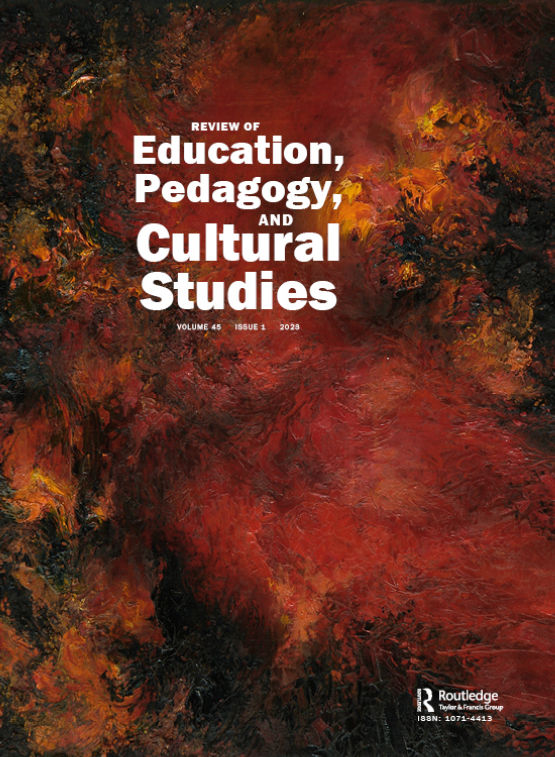Submit a Manuscript to the Journal
Review of Education, Pedagogy, and Cultural Studies
For a Special Issue on
Object Lessons: A special issue dedicated to nonhuman/nonliving kin
Manuscript deadline
01 December 2024

Special Issue Editor(s)
Jesse Bazzul,
University of Regina
[email protected]
Emily Ashton,
University of Regina
[email protected]
Valerie Triggs,
University of Regina
[email protected]
Object Lessons: A special issue dedicated to nonhuman/nonliving kin
The focus of this special issue is taking a somewhat different direction in theory and cultural studies with a focus on objects in education. The recent release of the Bloomsbury series “Object Lessons” edited by Ian Bogost and Christopher Schaberg, and the Atlantic series by the same title, has helped popularize a focus on the everyday, nonhuman (and very often nonliving) entities that literally comprise ethical, political, social, and ecological life today. Part of this focus has to do with the ontological turn in theory and research that began roughly two decades ago. More importantly, Indigenous knowledges and ways of living in the world have increasingly made their way into mainstream pedagogies that promote vibrant and knowledge-rich ecological, social, and spiritual relationships (LittleBear 2001; Kimmerer 2015). New/socio materialisms and posthuman pedagogies have attempted to steer critical theory and ‘post’ schools of thought toward more-than-human worlds (Barad 2007; Haraway 2016). Speculative realisms, more specifically object oriented ontology, has attempted to animate objects in strange ways that escape modern Western anthropocentrism (Morton 2016). Lastly, our current ecological moment. known to many as the Anthropocene, has forced many in the industrialized Global North to find ways of thinking that do not overly prioritize humans to the demise of all other species—including, ironically, humans themselves (Tsing et al. 2020). All of these movements have created a context for educators, students, and researchers to examine the everyday nonhuman/nonliving entities around them in ways that enrich relations with nonhuman beings, and at the same time reduce our obsession with human-human relations. Most of the time in modern Western societies, it is the natural sciences that guide how people think of the nonhuman world. For better or for worse. Yet, disciplines like the arts, Indigenous spiritualities, cultural studies, and educational philosophy and theory might also take a ‘stab’ at thinking about ‘how things exist’ or ontology (Harman, 2013).
The purpose of this special issue is to make forays, however small or laborious, into the worlds of objects that have educational significance. The ethico-political goal is to challenge anthropocentrism by resituating the stories and relations of objects. The pedagogical objective, like much of our work in education, is to provoke a response. A (re)turn to nonhuman entities. We’ve invited authors that can give this approach to scholarship a thorough start, and focus on the creative aspects of writing, whether that be with concepts, contexts, relationships or various meanings associated with specific objects. Like the object lessons series with Bloomsbury, we encourage meanderings so as to capture the contours of these objects and/or object relations. This issue is an invitation to take a step away from anthropocentric theory, research, and teaching.
Looking to Publish your Research?
Find out how to publish your research open access with Taylor & Francis Group.
Choose open accessSubmission Instructions
Instructions for authors
We are asking authors to choose writing about a singular object, bring it to life so to speak, and relate it somehow to the wide and wonderful field of education. Some examples might be: Ice, placenta, child, ruler, forest. While we encourage wide ranging responses to this special issue, we offer the following guidelines for authors contributing to the Object Lessons special issue:
- Submissions should be 3000-5000 words excluding references.
- Written in any reference system (e.g. APA, MLA, or Chicago).
- A transdisciplinary approach should be taken where authors draw from a variety of disciplines—history, chemistry, theology, Indigenous studies, the Arts, comparative literature, geography, philosophy, etc—to elucidate or bring their object into relation with readers.
- Objects should either relate directly to education or be brought into relation with education in some way—understanding that education is a wide-ranging field.
- Authors are encouraged to describe their experience, social location, and specific work/play in relation to these objects as this will help the reader understand their object relations.
- We encourage readers, wherever possible, to consider the environmental, anti-anthropocentric goal of the special issue, as well as the overall social and ecological justice mission of the Review of Education, Pedagogy, and Cultural Studies.
- Lastly, we recommend short titles. The shorter the better, even one word titles such as: Chalk Board, Theatre, Uniform, for example.
General Timeline
| Publication Step | Date |
| Invite and confirm authors for special issue | January 31, 2023 |
| Receive initial drafts from authors | June 30, 2023 |
| Give reviews and editorial feedback to authors | August 31, 2023 |
| Final drafts from authors due | November 30, 2023 |
| Articles published online with special issue to follow | January 31, 2024 |